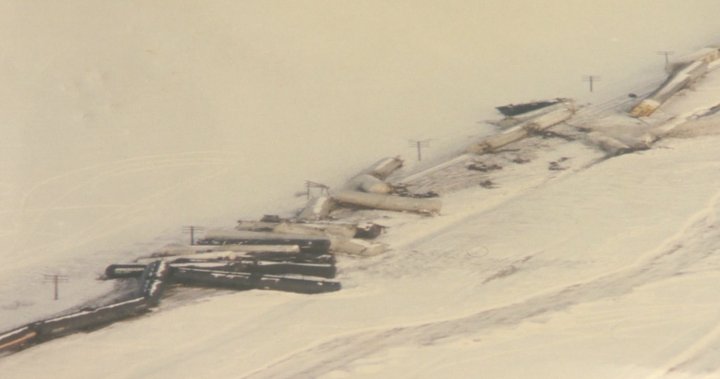The Christmas of 1992 etched an indelible mark on the small town of Oakville, Manitoba, a memory intertwined with both anxiety and an outpouring of community spirit. Cathie Bernd and her young son, Justin Markus, were on the cusp of a new beginning, moving to Oakville just a week shy of Christmas. Their arrival was met not with the promised peace and quiet, but with an urgent knock on the door and an unexpected order to evacuate. A CN Rail locomotive had derailed nearby, spilling hazardous materials and casting a pall of uncertainty over the town. The Bernds, along with 410 other residents, were abruptly displaced, their holiday plans derailed by the chilling prospect of toxic fumes and an unknown future. The looming question of whether they would even have a home to return to hung heavy in the air.
For three-year-old Justin, the evacuation was more of an adventure. The hotel stay, surrounded by other displaced children, became an impromptu holiday playground. His youthful obliviousness shielded him from the anxieties that gripped the adults. Other residents, like Len and Judy Essay, were away when the derailment occurred, their festive hockey game celebration interrupted by the urgent news. Len, a town councillor, recalls the remarkable display of unity in the face of adversity. Despite the disruption and uncertainty, the community rallied together, offering support and demonstrating a resilience that shone brightly amidst the crisis. Shelley Napier, a duty officer with the province’s Emergency Measures Organization, emphasized the crucial role this solidarity played in bolstering the town’s spirit. The bonds of neighbor helping neighbor, friend helping friend, and the comforting presence of familiar faces fostered a sense of resilience and helped mitigate the stress of the displacement.
The initial days of evacuation stretched into a week, then another, pushing Christmas and New Year’s celebrations into unfamiliar territory. Hotel rooms, family homes, and temporary accommodations became stand-ins for the festive gatherings residents had envisioned. While families grappled with the displacement, a tireless crew worked through the holidays to ensure the town’s safety and a swift cleanup. Colin Wilcox, an RCMP officer at the time, recalls patrolling the deserted streets on snowmobiles, safeguarding properties against potential threats, and offering a sense of security to the displaced residents. The bitter cold added another layer of hardship to the cleanup efforts, as Charlie Joyce, a CN employee, vividly remembers. The wide-open landscape offered no respite from the biting winds, making the arduous task even more challenging.
Finally, after weeks of uncertainty, on January 10, 1993, the residents of Oakville were allowed to return home. The holiday season of 1992 became a unique, albeit unsettling, chapter in their lives. Judy Essay reflects on the unusual Christmas, finding solace in the safety and support they received, regardless of their temporary location. The outpouring of generosity and kindness, particularly from the town’s volunteers, left a lasting impression on those involved in the cleanup and security efforts. Wilcox fondly remembers the delicious baking provided by the Oakville residents, a small gesture that provided immense comfort and boosted morale during the long and arduous days.
Despite the disruption and anxiety, the derailment inadvertently revealed the strength and compassion of the Oakville community. The shared experience forged stronger bonds and created lasting memories, albeit tinged with the echoes of the unexpected crisis. For Cathie Bernd and her son Justin, the incident became an unconventional welcome to their new home. Instead of the quiet, peaceful life they had anticipated, they were thrust into a dramatic event that tested the town’s resilience. However, they emerged from the experience with a newfound appreciation for the unwavering spirit of Oakville’s residents. The derailment, while disrupting their holiday season, ultimately connected them to a community that embraced them with open arms and unwavering support.
This incident, though fraught with anxiety and uncertainty, ultimately served as a testament to the human spirit’s capacity for resilience and compassion. The derailment may have disrupted Christmas, but it also unveiled the true heart of Oakville, a community that rallied together, offering support and kindness in the face of adversity. The memory of that Christmas serves as a poignant reminder of the strength that can be found in unity and the enduring bonds forged in challenging times. The story of Oakville’s derailed Christmas is not just a tale of disruption, but a testament to the power of community, resilience, and the enduring spirit of the human heart.

